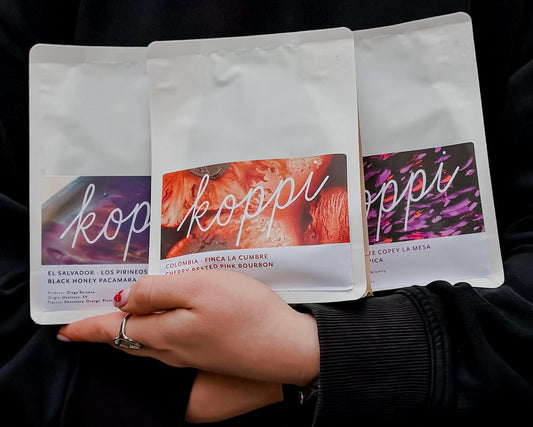
It’s May and time for spring to blossom and new life flourish across the natural world. In this frame of mind, it is a spectacular and harmonious partnership this month, as we feature Paso Paso! Please read the details that follow, but this team have taken a bold step by creating a coffee roastery owned by coffee producers! Inspiring and looking forward to see where this goes.
Thank you for being a part of Bean Bros, enjoy your coffee!
Hi Bram, please tell us about the concept behind Paso Paso.
Paso Paso is a coffee roastery owned by coffee producers. This fundamentally shifts the distribution of equity in the value chain and allows producers to reap the full benefits of the coffee industry. Beyond that, the producers also actively participate in decisionmaking and shaping our vision for the future.
The idea came to me when I was working as a green coffee buyer for a renowned specialty coffee importer. Here the differences in growth potential were observed between roasters and producers. From there it became a crazy idea that I discussed with my friends, who now became partners. All the producers were beyond excited for the idea. It took us three years from the initial idea to launching the brand.
Currently we are two months in operation now, we’ve been overwhelmed by the positive response from the industry and media. We have just finished our selection for the July ‘24 to June ‘25 season and are very excited to share more about that in the coming months. Our next big event will be WoC Copenhagen where we all see each other for the first time together.
What is behind the name?
Paso Paso means ‘step [by] step’. It is a reminder that this is a marathon and not a sprint. It reflects my personal journey in setting up this company and the journeys of all our founders and their farms.
Anything you would like to highlight that you are proud of?
It is quite boring, but it is that we managed to set up the company! We are proudly registered in the Court of Hanover as a business with shareholders from Ethiopia, Costa Rica, Nicaragua, El Salvador and The Netherlands. This was a painfully difficult bureaucratic process. But it is our foundation, we are built on the fact that the producers are shareholders. To me this is the biggest step ever taken to include coffee producers more into the industry.

Any key areas you are currently focussing on?
Our first year in business is focused on learning about the roasted market and how it works. We have a lot of knowledge about farming coffee and green coffee trade, but not so much about roasted. This is another key point for our business, to spread more knowledge about the full coffee supply chain back to the producers. Coffee roasters don’t often share their inner business working and data with the coffee producers. So a lot of the coffee roasted sales are very untransparent. Transparency tends to focus only on purchasing and not on sales of coffee.
Is this a model that could or even should be replicated?
Yes definitely! We hope to inspire others to do the same and are happy to consult. We have gotten many requests from other producers about how they could join our initiative. Nevertheless, it is not an easy model to replicate, having a person well versed on both sides of the supply chain is imperative. However, I can see many different iterations of what we do, work well as well. One option is to export roasted coffee, which some people already do, and another is to have coffee toll-roasted and only taking charge of sales and not roasted (as a producer). I don’t think we see many Paso-Paso style companies in the next year or two, but in 10 years there will be more of us, no doubt.
Do you target coffee trends in bean consuming countries or prefer to focus on the quality of product at origin and people enjoying that for what it is?
The trend we’re mostly after is the need for a more genuine and authentic relationship with coffee brands. Since we are only six farms people will know what to expect year-on-year and can become part of our journey. We hope people will connect to 1) the idea of Paso Paso and 2) the specific farms. They can then pick the coffee that fits their palate and budget. In the coming months we will expand our offerings so we show the diversity of our farms and allow for people to choose the profile they like.

Coffee of the Month:
ETHIOPIA - SYOUM FAMILY - HEIRLOOM NATURAL
Bette Buna, translating to ‘the house of coffee’ in Amharic, embodies a home for the coffee community, promoting equal development opportunities. Sourced from our own Megadu farm in the Guji region, this coffee thrives at elevations between 1998 to 2200 meters across 220 hectares. Our approach combines traditional and modern methods. Handpicked in November and December, the ruby red cherries undergo natural fermentation, followed by drying on raised beds in mixed sun and shade for optimal flavor. After reaching the desired moisture, the cherries are stored locally to maintain freshness. We support our community with fair wages, housing, and education,
ETHIOPIA - SYOUM FAMILY - HEIRLOOM WASHED
The Sidama region is ideal for specialty coffee due to its fertile soils and diverse forests. Coffee is a major economic activity here, with village brokers playing a key role in the coffee’s journey to processing mills where both washed and natural Sidamo coffees are produced. The washed heirloom coffee, known for its floral aromas, is carefully roasted to preserve these qualities, using a light roast process that emphasizes its natural praliné-like chocolate sweetness and tropical notes of orange and melon. This process involves roasting the coffee for twelve minutes at 201C, with a development time of 1:20
EL SALVADOR - DIEGO BARAONA - BOURBON ELITE BLACK HONEY
Diego Baraona maintains the historic Bourbon Elite coffee variety, a rare direct mutation of Typica, which has been affected by the coffee leaf rust outbreak but is noted for its unmatched sweetness. Despite easier alternatives, Diego preserves these century-old plants to honor his farm’s legacy. This lot is processed using the black honey method, where seeds are gently depulped without water, retaining the mucilage. The beans undergo a two-day sun fermentation in thick layers, followed by up to forty days in shaded drying beds. After resting in sealed bags for 3 months, the coffee is hand-sorted and prepared for international shipping.






